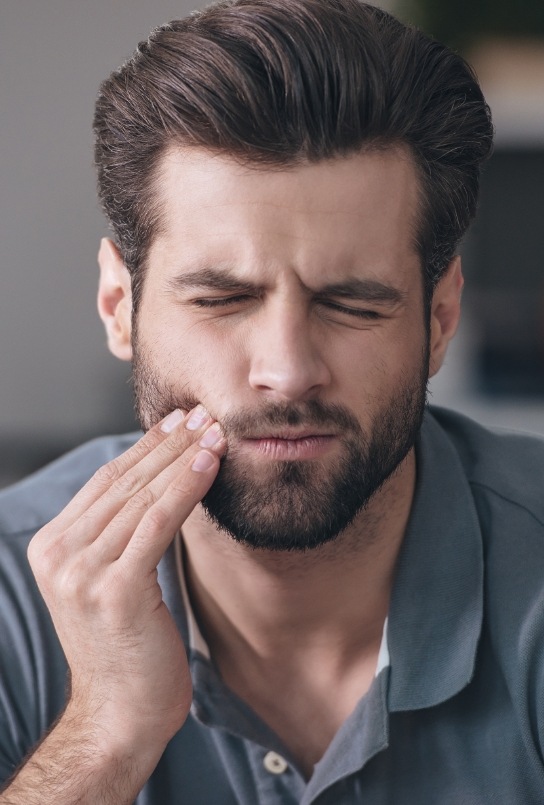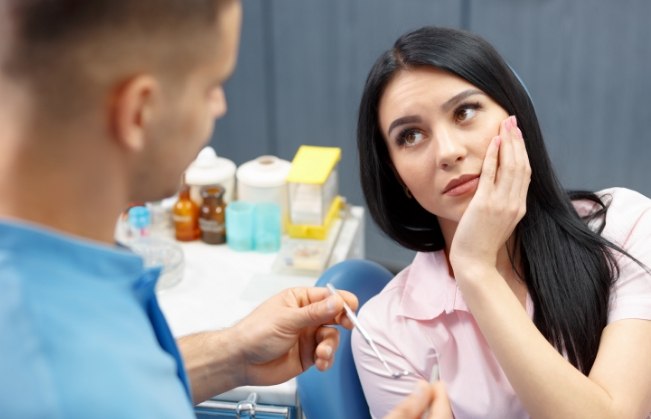Emergency Dentist Federal Way
We Want to Help You Out of Pain

Our patients deserve timely care, and that is why we take dental emergency appointments seriously. We know how painful these injuries to the mouth can be, which is why we do everything we can to provide treatment as quickly as possible. As experienced emergency dentists in Federal Way, Dr. Navi and Dr. Mace will help alleviate the discomfort while also administering appropriate care that puts your smile back on track. Find out how we can make a dental emergency less stressful for you by calling our office.
Why Choose Precision Dental Care for Emergency Dentistry?
- High-End Dental Technology for Faster Diagnostic Imaging
- Dentists with Decades of Proven Experience
- Calming and Compassionate Team Members
How We Treat Dental Emergencies

Treating your dental emergency requires that you first call our office to schedule an appointment. A member of our front desk staff will find a time for you to come in so that we can begin to address the problem. When you arrive, you’ll be escorted to a treatment room, where we will take digital images that allow for further analysis of the problem area. After crafting a personalized treatment plan, we will work to alleviate your pain and administer necessary care.
The Most Common Dental Emergencies
Not all dental emergencies are created equal. Some are more time-sensitive and serious than others. But no matter what kind of injury you’ve suffered, you’re always encouraged to call our office for help. If you’re unsure whether to notify our team of your situation, take a look at the common dental emergencies we treat at Precision Dental Care below.
Understanding the Cost of Dental Emergencies

Seeing a dentist when you may not need to is a concern most people have, especially since everything comes at a cost. However, avoiding treatment because you don’t have the financial means or think your situation isn’t serious can lead to more significant problems down the road. We cannot determine the cost of your dental emergency treatment until we see you in our office. Once we identify the issue and recommend a restorative method of care, we can discuss ways to maximize your dental benefits as well as go over alternative payment options to ease your financial burden.
Keys to Preventing Dental Emergencies

We know that not all dental emergencies are avoidable, but those that stem from poor oral hygiene can be minimized, especially if you adopt these habits:
- Brush your teeth using a soft-bristled brush for two minutes, floss at least once a day, and rinse with an antimicrobial mouthwash to eliminate bad bacteria.
- Continue to keep your six-month dental checkups and teeth cleanings to allow our team to check for any signs of decay or gum disease that might exist.
- Wear a customized nightguard when sleeping if you are prone to bruxism.
- Wear a customized mouthguard if you play sports or engage in physical activities that might put your teeth and gums at risk.
- Eat a diet full of nutrient-rich foods that include leafy greens, fruits and vegetables, lean meats, and dairy.
- Give up unhealthy habits that put your smile at risk, such as smoking and eating ice.
Emergency Dentistry FAQs
How Can I Sleep with a Toothache?
Tooth pain can prevent you from getting restorative sleep, but there are things you can do to help you through the night until you can come to our office. First, when you lie down, raise your head above your heart with an extra pillow. This position reduces blood from rushing to your head and exacerbating the pain. You may safely take over-the-counter pain reliever as directed, and you can also put a cold compress on your face. Applying it in 10-minute intervals can numb the area and allow you to fall and stay asleep.
Can the Emergency Room Help during a Dental Emergency?
Only certified dentists are legally allowed to perform oral procedures, which means that emergency room staff members can usually do very little to help in these kinds of situations. At most, they can provide pain medication and antibiotics, but you will still need to see a dentist for treatment. In other words, you’ll spend a lot of money to be referred to a dentist anyway! Instead of wasting time and funds, turn to us, your emergency dentist in Federal Way, directly and contact us as soon as possible. We’ll give you relief and address the underlying problem.
That being said, if you have serious lacerations or cuts in or around the mouth, a broken or dislocated jawbone, or an abscess or other oral problem that interferes with breathing or swallowing, you should go to the emergency room first.
Can a Damaged or Infected Tooth Repair Itself?
Unlike other tissues in the body, tooth enamel and other layers of structure do not heal or have new growth. Your chipped, cracked, decayed, or otherwise ailing tooth will at best remain that way but will likely get worse without treatment. As a result, you don’t need to postpone getting help at all. In fact, the sooner you have the problem resolved, the better off the tooth will be. The longer you wait, the more extensive the damage can become.
What Should I Have in a Dental Emergency Kit?
Just like a first-aid kit can come in handy during a medical emergency, a dental emergency kit should have supplies that can help you address an urgent issue in the short term. This kit should include the following items:
- Contact information to the dental practice
- Small storage container for teeth or restorations
- Sterile gloves (ideally nitrile, not latex)
- Gauze pads and dressings
- Cotton balls
- Dental cement (or another temporary filling material)
- Petroleum jelly
- Anti-inflammatories such as ibuprofen
- Topical anesthetic like Orajel
- Floss
- Ice pack
- Denture adhesive
I Need a Checkup & Cleaning I Have a Cavity or Broken Tooth I am Missing One or More Teeth I Want to Enhance My Smile I Want a Straighter Smile View Our Services
